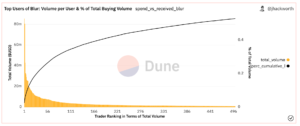Experts say the rejection may have already been priced in and that the official announcement may turn out to be a “neutral event.”

The rejection of a spot ether ETF in May is unlikely to significantly affect ETH prices, but an unexpected approval would, said one expert.
(Shutterstock)
Posted April 17, 2024 at 7:00 am EST.
Several spot ether (ETH) exchange traded fund (ETF) applications will likely be rejected by the U.S. Securities and Exchanges Commission (SEC) at the end of May, according to most analysts familiar with the process.
One such expert, Bloomberg ETF analyst Eric Balchunas, has consecutively lowered his estimates of the chances that a spot ether ETF will be approved from 70% to a mere 25%, a factor that may have contributed to lower ETH prices since mid-March.
Decentralized prediction markets such as Polymarket paint an even bleaker picture, forecasting a paltry 18% probability of an SEC approval. And Jan van Eck, CEO of investment management firm, VanEck, which was the first company to apply for a spot ether ETF with the SEC, recently admitted that it was unlikely VanEck’s application would be approved by the SEC’s final deadline of May 23.
With the consensus being that the SEC will reject all spot ether ETF applications next month, many are wondering how the rejections will impact ether’s price, as well as that of other cryptocurrencies.
“At this stage I think the rejection is priced in, basically no one is expecting an approval right now,” Lark Davis, an entrepreneur and crypto investor with over a million followers on X, told Unchained. “There could still be some volatility in the direct aftermath of the news, but overall, not a big deal.”
Efficient Markets
What Davis was describing is the efficient-market hypothesis – a phenomenon seen in traditional markets where current asset prices already reflect existing information. He said a similar dynamic takes place in crypto markets. This means the rejection of a spot ether ETF is unlikely to significantly affect ETH prices, but an unexpected approval will.
“Approval is the only factor that matters and will send ETH higher due to new demand vectors,” said Davis.
Jonathan Bier, chief investment officer at London-based investment management firm Farside Investors, told Unchained that he also considers the potential rejection already “priced in.” Additionally, Bier said a spot ether ETF is not as critical to the crypto ecosystem as the bitcoin spot ETF is.
“Ethereum is about DAPPs [decentralized applications], technological innovation and progress, as well as staking derivatives,” Bier explained. “Bitcoin on the other hand, is more of a financial asset, an alternative monetary system, a digital gold system, and therefore potentially more interesting for asset managers, ETF providers, and Wall Street.”
Impact on Bitcoin?
Bitcoin and ether tend to rise and fall together, with a correlation of about 62% as of April 11, according to data from analytics site PortfoliosLab (a correlation of 100% would mean they move exactly in tandem). Bitcoin and ether have market capitalizations of just under $1.25 trillion and $373 billion, respectively — comprising nearly 70% of the entire $2.4 trillion crypto market.
Essentially, whatever happens to either cryptocurrency will likely affect the entire ecosystem, and for now, most agree that ETH will continue trading normally even if the SEC rejects the pending ETF applications.
“I don’t see a broad impact to the wider crypto market on this news,” Davis said. “Absence of an ETF for ETH is a neutral event because ETH has done just fine without one so far.” Indeed, ether is up about 45% year to date, compared to bitcoin’s 52% gain over the same period.
However, the same experts who are bearish on a spot ether ETF approval in May predict that one will eventually be granted over the long term. The first bitcoin spot ETF application was filed in July 2013, meaning it took more than a decade for the approval to be granted.
The ether ETF approval timeline will probably be less than a decade, but it won’t be in May, and most importantly, few expect any significant decrease in the price of ETH if the SEC – as anticipated – rejects VanEck’s application on May 23.
“Ethereum is rising with the overall market and rising demand for ETH for restaking on ETH layer 2s like Base. An ETF denial does not change that,” Davis explained. “The ETF would be a big liquidity boost, or should I say will be, because we will get one eventually, just not in May.”
- SEO Powered Content & PR Distribution. Get Amplified Today.
- PlatoData.Network Vertical Generative Ai. Empower Yourself. Access Here.
- PlatoAiStream. Web3 Intelligence. Knowledge Amplified. Access Here.
- PlatoESG. Carbon, CleanTech, Energy, Environment, Solar, Waste Management. Access Here.
- PlatoHealth. Biotech and Clinical Trials Intelligence. Access Here.
- Source: https://unchainedcrypto.com/should-you-sell-ether-ahead-of-the-secs-expected-rejection-of-a-spot-ether-etf-on-may-23/
- :has
- :is
- :not
- :where
- $UP
- 00
- 11
- 17
- 2013
- 2024
- 23
- 25
- 32
- 33
- 35%
- 4
- 5
- 7
- a
- About
- According
- Additionally
- affect
- aftermath
- agree
- ahead
- All
- already
- also
- alternative
- am
- an
- analyst
- Analysts
- analytics
- and
- Announcement
- Anticipated
- any
- Application
- applications
- Apply
- approval
- approved
- April
- ARE
- AS
- asset
- asset-managers
- At
- base
- Basically
- BE
- bearish
- because
- been
- being
- Big
- Billion
- Bitcoin
- Bitcoin spot etf
- Bloomberg
- boost
- broad
- but
- by
- ceo
- chances
- change
- chief
- commission
- company
- compared
- comprising
- Consensus
- considers
- continue
- contributed
- Correlation
- could
- critical
- crypto
- Crypto ecosystem
- Crypto Market
- Crypto Markets
- cryptocurrencies
- cryptocurrency
- Current
- DApps
- Date
- Davis
- deadline
- deal
- decade
- decentralized
- Decentralized Applications
- decrease
- Demand
- Derivatives
- describing
- digital
- digital gold
- direct
- does
- done
- Dont
- due
- dynamic
- ecosystem
- either
- end
- Entire
- Entrepreneur
- eric
- estimates
- ETF
- ETH
- Ether
- Ether (ETH)
- Even
- Event
- eventually
- exactly
- exchange
- Exchanges
- existing
- expect
- expected
- expecting
- expert
- experts
- explained
- factor
- Fall
- familiar
- far
- few
- filed
- final
- financial
- fine
- Firm
- First
- followers
- For
- from
- fund
- Gain
- get
- Gold
- granted
- hand
- happens
- Have
- he
- High
- higher
- his
- How
- HTTPS
- i
- if
- Impact
- importantly
- in
- information
- Innovation
- interesting
- investment
- investor
- Investors
- IT
- Jan
- jpg
- July
- just
- Lark Davis
- layer
- Layer 2s
- less
- like
- likely
- Liquidity
- Long
- lower
- lowered
- management
- Managers
- many
- Market
- Markets
- Matters
- max-width
- May..
- mean
- meaning
- means
- million
- Monetary
- Month
- more
- most
- move
- nearly
- Neutral
- New
- news
- next
- no
- normally
- now
- of
- Officer
- official
- on
- ONE
- only
- or
- Other
- out
- over
- overall
- paint
- pending
- period
- phenomenon
- picture
- Place
- plato
- Plato Data Intelligence
- PlatoData
- polymarket
- posted
- potential
- potentially
- predict
- prediction
- prediction markets
- price
- Prices
- probably
- process
- Progress
- providers
- reflect
- reject
- Rejected..
- rejects
- right
- Rise
- rising
- s
- Said
- same
- say
- SEC
- Securities
- see
- seen
- sell
- send
- should
- shutterstock
- significant
- significantly
- similar
- since
- site
- So
- so Far
- some
- Spot
- spot etf
- Stage
- Staking
- Still
- street
- such
- system
- takes
- Tandem
- technological
- tend
- term
- than
- that
- The
- therefore
- they
- Think
- this
- timeline
- to
- together
- told
- took
- traded
- Trading
- traditional
- traditional markets
- Trillion
- TURN
- u.s.
- U.S. Securities
- Unchained
- under
- Unexpected
- unlikely
- van
- VanEck
- vectors
- Volatility
- Wall
- Wall Street
- was
- we
- WELL
- whatever
- which
- WHO
- wider
- will
- with
- without
- wondering
- would
- X
- year
- you
- youtube
- zephyrnet












